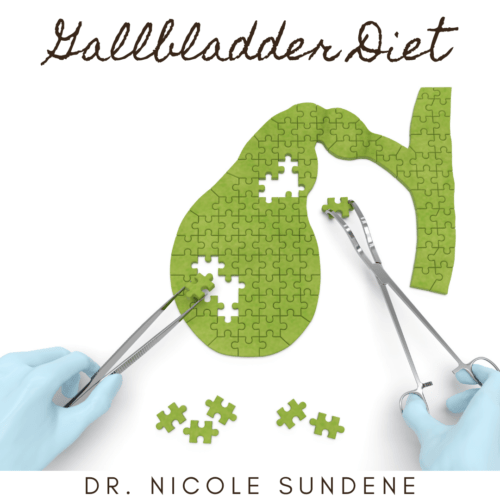
Dr. Nicole Sundene, NMD
Scottsdale Naturopathic Doctor
Gallstones and gallbladder disease are very common women's health conditions best served by a Naturopathic Doctor unless surgery is required. Whether you are working to avoid having your gallbladder removed, or you have already had your gallbladder removed you will need to follow this gallbladder diet.
Patients with emergency clogged bile ducts must have their gallbladders removed as it is a true medical emergency. Whereas patients with gallstones their doctor is keeping an eye on are good candidates for this diet. When patients have their gallbladders removed they generally have chronic diarrhea without a pouch to collect their bile, and instead have bile constantly dripping into their intestines which triggers chronic diarrhea.
Signs of gallstones causing an emergency are sharp pain in the right lower rib cage, sharp pain in the right shoulder blader, fever, chills, and/or yellowing of the eyes or jaundice. Patients do not need to have all of these symptoms to need to go to the emergency room for surgery.
Your gallbladder is a “pouch” below the liver that stores a fat emulsifying liquid (bile) produced by the liver.
While a small amount of cholesterol in the bile is normal, bile acids and lecithin are necessary to keep the cholesterol soluble. When there is more cholesterol than the bile salts and lecithin can dissolve, gallstones begin to form. Gallstones can be a medical emergency requiring immediate removal of the gallbladder located within the liver, or they may be under "watchful waiting" with instructions to go to the ER for emergency surgery should they develop sudden sharp pain in their upper right shoulder blade, or pain under their right rib cage where the liver is located.
This type of gallstone, made primarily of cholesterol, occurs most frequently. There are also many types known as “mixed” because they contain varying amounts of calcium and bilirubin along with cholesterol.
Gallstones (cholelithiasis) and inflammation of the gallbladder (cholecystitis) are the two most common forms of gallbladder disease. Gallstones are usually present when there is an inflammatory process going on within the gallbladder, and there is a controversy as to which of these disorders occurs first.
What follows are dietary guidelines to decrease both the cholesterol saturation of the bile and the irritation and inflammation of the gallbladder. Since the two conditions are so closely related, the same dietary guidelines apply. If you feel any of them need to be modified for your unique situation, please ask your doctor.
Gallstones can be a medical emergency requiring immediate removal of the gallbladder located within the liver, or they may be under "watchful waiting" with instructions to go to the ER for emergency surgery should they develop sudden sharp pain in their upper right shoulder blade, or pain under their right rib cage where the liver is located.
Dr. Nicole Sundene
(480) 837-0900
Dr. Sundene is a Naturopathic Doctor in Scottsdale, Arizona, and is a Female Hormone Expert in Women's Health and Bioidentical Hormones. She specializes in Holistic Women's Health for Menopause, Thyroid, Hashimotos, PMS, Perimenopause, Autoimmune, Postpartum, Chronic Fatigue, Depression, Anxiety, Food Allergies, Digestion, Dermatology, Acne, Psoriasis, Eczema, and Adrenal Hormonal Conditions. In 1999 she began working for a Hormone Doctor prior to starting Naturopathic Medical School. With over 23 years of experience in both Prescription and Natural women's health and hormones, she presents to women the best-integrated health solutions for their Chronic Disease.
She has been an Herbalist for over 28 years and enjoys teaching women how to use herbs to balance their hormones, nutrition and optimize their health. Dr. Sundene relies on blood testing for her hormone metrics. The hormone testing is covered per the patient's insurance plan (not Medicaid) and conducted at certain points in the woman's menstrual cycle. To learn more about Hormone Testing for Women Visit: Bioidentical Hormones. Follow Dr. Sundene on Instagram, Twitter, and Facebook for more tips on Women's Health, Female Hormones, and Naturopathy!


